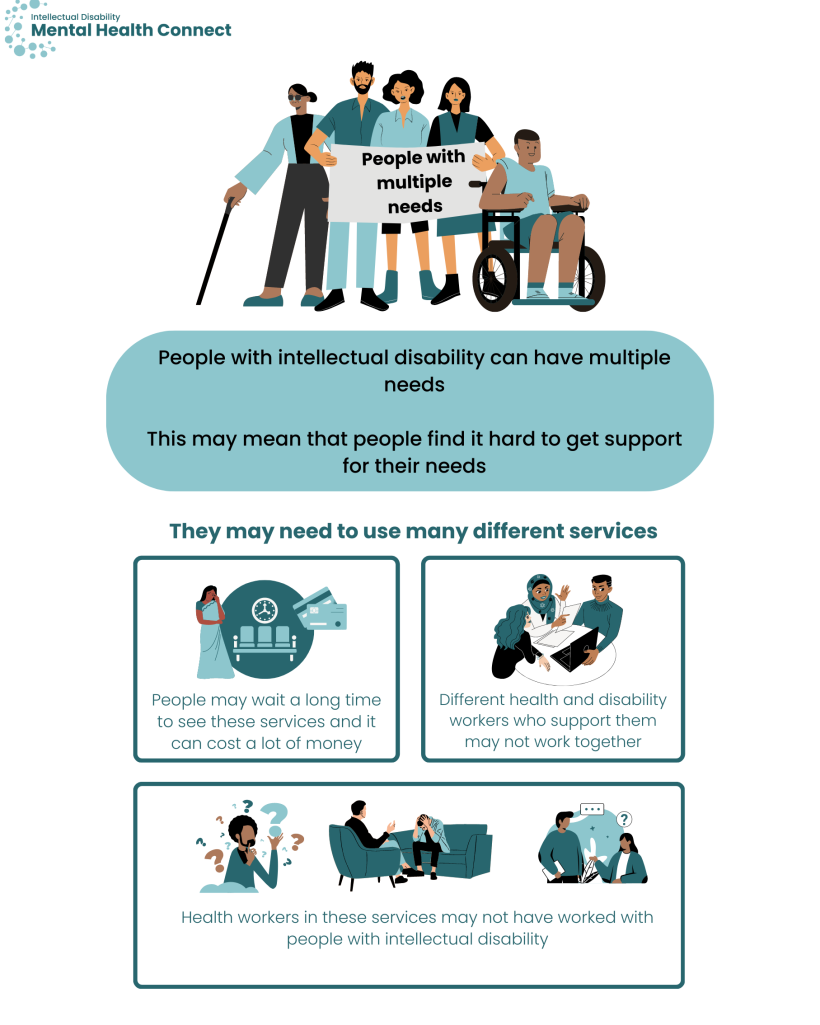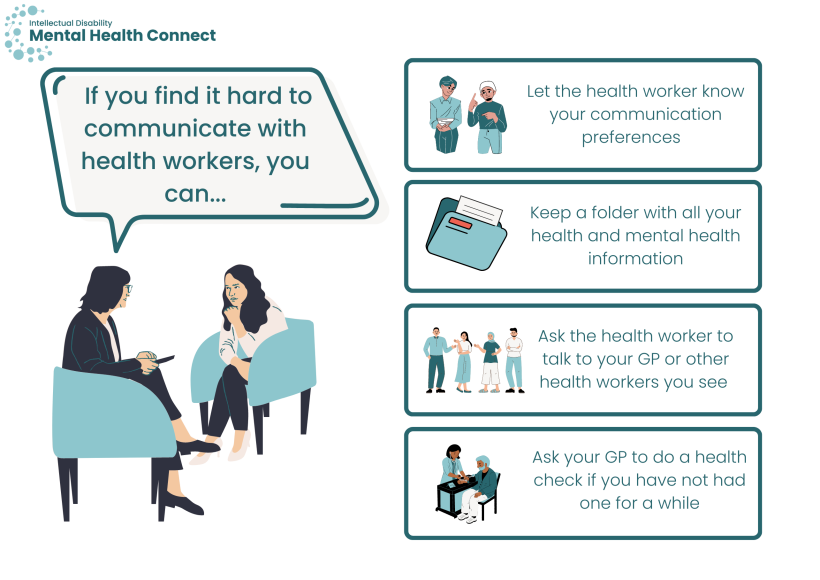People with multiple needs
Jump to a section below
Introduction
People with intellectual disability can have multiple needs. Multiple needs are also sometimes known as complex needs. Complex needs means that there are different things happening in the person’s life such as disability and many health problems. This may mean that people find it hard to get support for these needs.
Having complex needs means that the person may need to use many different services. You can find out more about different services and what they do in Services for mental health. There is usually not one service that the person can go to for all their needs. This means that people with intellectual disability may:
- have to wait a long time to see these services and it can cost a lot of money
- see different health and disability workers. These workers may not talk to each other or work together.
The health workers may not have worked with people with intellectual disability. They may wrongly think that the health or mental health problems a person is having are because of their intellectual disability.
- Sometimes this happens because the health worker does not know the person well.
- Sometimes it can also happen if the person with intellectual disability has trouble communicating with health workers about their health and what is happening to them.

Concerns you may face when getting help for your mental health and what you can do
Health workers think your health or mental health problem is because of your intellectual disability
You may be worried the health workers you work with will think that your health or mental health problem is because of your intellectual disability. If this happens, you can:
- discuss with the health worker that you feel different to normal
- ask your doctor or someone you trust to put together and share information about your health. Sharing this information with other health workers can help them understand what is happening with you now. For more information on types of information you can share visit the Assessment page.
- advocate for yourself or ask someone you trust to advocate for you. For more information visit About advocacy. An advocate is someone who speaks up to get you the support you need. You can also ask someone you trust to come with you to your appointments. They can explain to the health worker that you are feeling or acting differently to normal.
You cannot tell health workers about what is wrong
You may feel worried because you do not know how to tell health workers about what is wrong or how you are feeling.
If you find it hard to communicate with health workers, you can:
- let the health worker know or ask someone you trust to let the health worker know
- how you want to communicate with them
- how they should communicate with you
- keep a folder with all your health and mental health information. You can take this folder to all your appointments. Health workers can look at your folder and know more about you. There are examples of folders you can look at to help you make your own. You can look at the Council for Intellectual Disability’s My Health Matters folder or the A2D Together Folder. We also have a My Mental Health Passport.
- ask the health worker to talk to your GP or other health workers you see. They can work together to help find out what support you need
- ask your GP or doctor to do a health check if you have not had one for a while. You can ask your doctor if you do not know if you have had a full health check.

The health worker does not know how to help or how to work with you
Sometimes health workers do not know what is wrong. This could be because they do not know you well or they have not worked with many people with intellectual disability.
If they do not know how to help, you can ask them to get advice from a service that knows how to work with people with intellectual disability. These services are called specialist services. Specialist services can work together with your health worker to find out what is wrong and how to help.
You can ask them to contact:
- a Specialist Intellectual Disability Health Team for advice on health or mental health problems. There is information about specialist teams here. You can show your health workers this link for Specialist intellectual disability services details.
- the Centre for Disability Studies Complex Care Service who can support those whose complex health needs cannot be met by another service
- a Statewide Intellectual Disability Mental Health Hub for advice on mental health problems. There is one for adults and one for children.
Please note that you are not able to contact these services yourself. Discuss with your GP or mental health worker if these specialist services could help you. They can contact the services for you.
You cannot get the supports you need because the NDIS is too difficult
If you have complex needs, it can be hard to get all the supports you need. There is a lot of planning that needs to happen and it can take a long time to get the supports you need. Sometimes the National Disability Insurance Scheme (NDIS) system does not see that you have many different needs. This means you may not get the funding you need to get the support you need.
This can make you feel worried or angry but there are things you can do. You can:
- ask someone you trust to see if you can get a specialist support co-ordinator. A specialist support co-ordinator is someone who works with people with complex needs to plan and organise the supports they need
- communicate with your doctor or health worker. They may be able to talk to the NDIS for you to help make sure you have the supports you need
- advocate for yourself or ask someone you trust to advocate for you. For more information visit About advocacy.There are ways that you can complain if you are not happy with the NDIS.
Services and supports
- Specialist Intellectual Disability Health Teams know how to work with people with intellectual disability. They can work with your doctor or health workers to help support you. Visit the Services page for more information.
- The Statewide Intellectual Disability Mental Health Hubs can work with your doctor or health workers. They know how to work with people with intellectual disability and can give advice to your doctor.
- You can let your doctor know about these services.
- The Centre for Disability Studies Complex Care Service can support those whose complex health needs cannot be met by another service.
- The Admission2Discharge (A2D) Together Folder can keep together your health information. This can make it easier for you if you need to go to hospital.
- The Council for Intellectual Disability has a My Health Matters folder. It can help you communicate with your health workers.